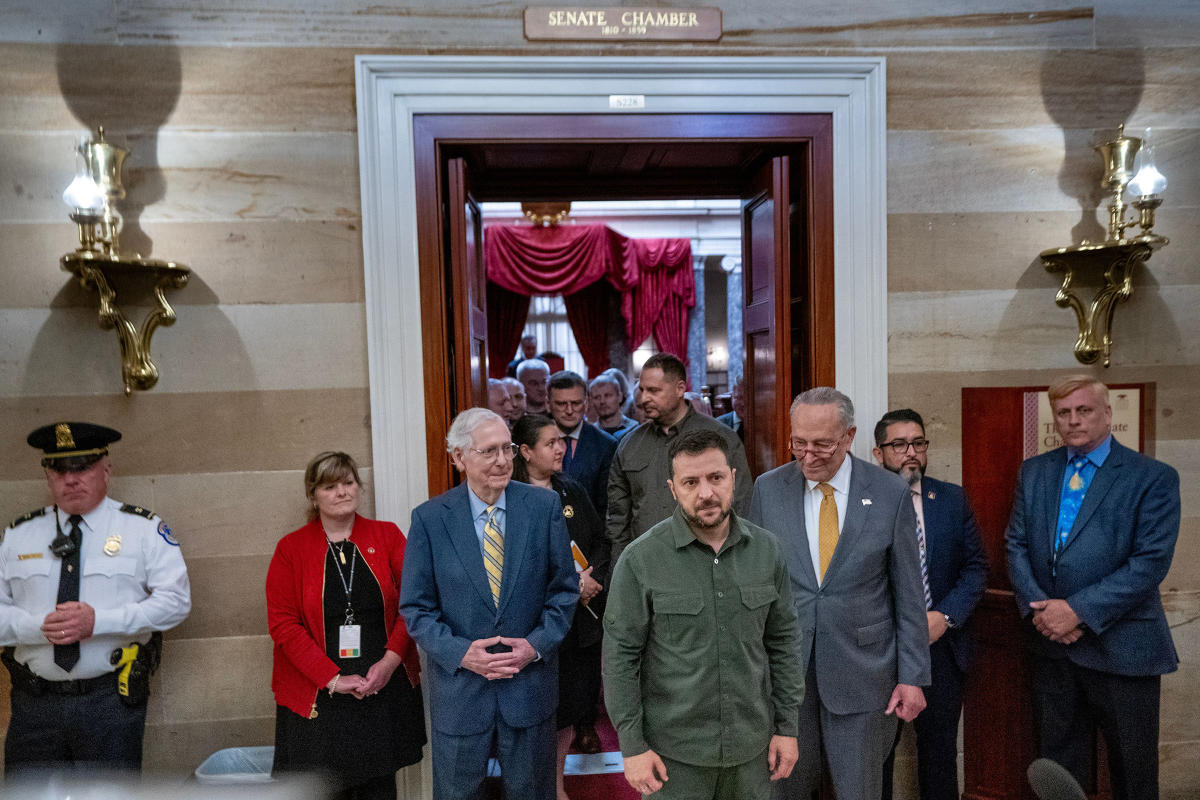But some of the accusations have been hard to deny. In August, a Ukrainian news outlet known for investigating graft, Bihus.info, published a damning report about Zelensky’s top adviser on economic and energy policy, Rostyslav Shurma. The report revealed that Shurma, a former executive in the energy industry, has a brother who co-owns two solar-energy companies with power plants in southern Ukraine. Even after the Russians occupied that part of the country, cutting it off from the Ukrainian power grid, the companies continued to receive state payments for producing electricity.
Read More: Inside the Kremlin’s Year of Ukraine Propaganda.
The anticorruption police, an independent agency known in Ukraine as NABU, responded to the publication by opening an embezzlement probe into Shurma and his brother. But Zelensky did not suspend his adviser. Instead, in late September, Shurma joined the President’s delegation to Washington, where I saw him glad-handing senior lawmakers and officials from the Biden Administration.
Soon after he returned to Kyiv, I visited Shurma in his office on the second floor of the presidential headquarters. The atmosphere inside the compound had changed in the 11 months since my last visit. Sandbags had been removed from many windows as new air-defense systems had arrived in Kyiv, including U.S. Patriot missiles, which reduced the risk of a rocket attack on Zelensky’s office. The hallways remained dark, but soldiers no longer patrolled them with assault rifles, and their sleeping mats and other gear had been cleared away. Some of the President’s aides, including Shurma, had gone back to wearing civilian clothes instead of military garb.
When we sat down inside his office, Shurma told me the allegations against him were part of a political attack paid for by one of Zelensky’s domestic enemies. “A piece of sh-t was thrown,” he says, brushing the front of his starched white shirt. “And now we have to explain that we are clean.” It did not seem to trouble him that his brother is a major player in the industry that Shurma oversees. On the contrary, he spent nearly half an hour trying to convince me of the gold rush that renewable energy would see after the war.
Perhaps, I suggested, amid all the concerns about corruption in Ukraine, it would have been wiser for Shurma to step aside while under investigation for embezzlement, or at least sit out Zelensky’s trip to Washington. He responded with a shrug. “If we do that, tomorrow everybody on the team would be targeted,” he says. “Politics is back, and that’s the problem.”
A few minutes later, Shurma’s phone lit up with an urgent message that forced him to cut our interview short. The President had called his senior aides into a meeting in his office. It was normal on Monday mornings for their team to hold a strategy session to plan out the week. But this one would be different. Over the weekend, Palestinian terrorists had massacred many hundreds of civilians in southern Israel, prompting the Israeli government to impose a blockade of the Gaza Strip and declare war against Hamas. Huddled around a conference table, Zelensky and his aides tried to understand what the tragedy would mean for them. “My mind is racing,” one of them told me when he emerged from the meeting that afternoon. “Things are about to start moving very fast.”
From the earliest days of the Russian invasion, Zelensky’s top priority and perhaps his main contribution to the nation’s defense had been to keep attention on Ukraine and to rally the democratic world to its cause. Both tasks would become a lot harder with the outbreak of war in Israel. The focus of Ukraine’s allies in the U.S. and Europe, and of the global media, quickly shifted to the Gaza Strip.
“It’s logical,” Zelensky tells me. “Of course we lose out from the events in the Middle East. People are dying, and the world’s help is needed there to save lives, to save humanity.” Zelensky wanted to help. After the crisis meeting with aides, he asked the Israeli government for permission to visit their country in a show of solidarity. The answer appeared the following week in Israeli media reports: “The time is not right.”
A few days later, President Biden tried to break through the impasse Zelensky had seen on Capitol Hill. Instead of asking Congress to vote on another stand-alone package of Ukraine aid, Biden bundled it with other priorities, including support for Israel and U.S.-Mexico border security. The package would cost $105 billion, with $61 billion of it for Ukraine. “It’s a smart investment,” Biden said, “that’s going to pay dividends for American security for generations.”
But it was also an acknowledgment that, on its own, Ukraine aid no longer stands much of a chance in Washington. When I asked Zelensky about this, he admitted that Biden’s hands appear to be tied by GOP opposition. The White House, he said, remains committed to helping Ukraine. But arguments about shared values no longer have much sway over American politicians or the people who elect them. “Politics is like that,” he tells me with a tired smile. “They weigh their own interests.”
At the start of the Russian invasion, Zelensky’s mission was to maintain the sympathy of humankind. Now his task is more complicated. In his foreign trips and presidential phone calls, he needs to convince world leaders that helping Ukraine is in their own national interests, that it will, as Biden put it, “pay dividends.” Achieving that gets harder as global crises multiply.
But faced with the alternative of freezing the war or losing it, Zelensky sees no option but to press on through the winter and beyond. “I don’t think Ukraine can allow itself to get tired of war,” he says. “Even if someone gets tired on the inside, a lot of us don’t admit it.” The President least of all. —With reporting by Julia Zorthian/New York
Contact us at [email protected].

David Turner is a globe-trotting journalist who brings a global perspective to our readers. With a commitment to shedding light on international events, he explores complex geopolitical issues, offering a nuanced view of the world’s most pressing challenges.



/cdn.vox-cdn.com/uploads/chorus_asset/file/25443517/Ghost_of_Tsushima_Director_s_Cut_Wallpaper.jpg)




